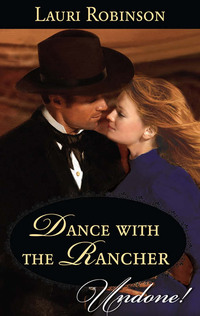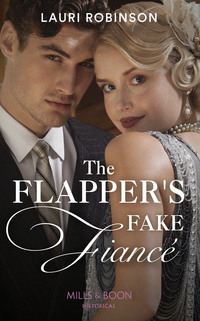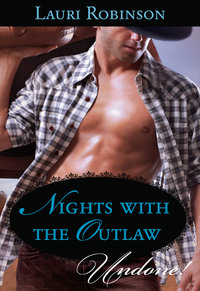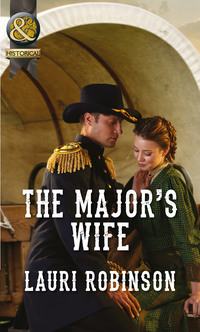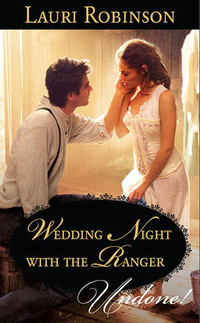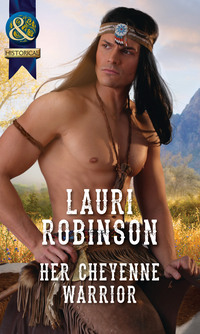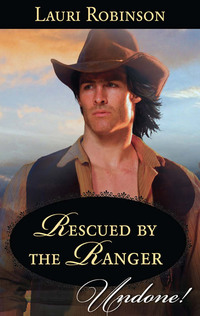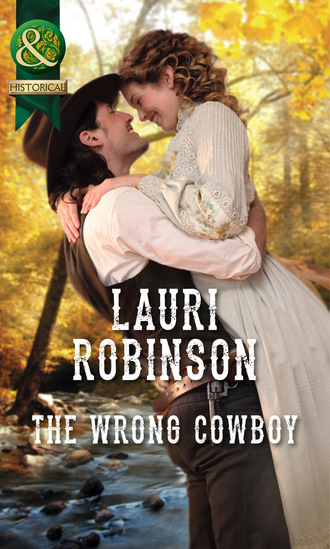
Полная версия
The Wrong Cowboy
Six sets of startled eyes—for the children had never been spoken to with such harshness—instantly turned to their bags. In a matter of seconds, they were all reading. Or, at least, holding books in their hands with their heads hung over the pages.
She shouldn’t feel this thankful to see them all sitting quietly, but in truth they hadn’t sat still for more than five minutes since leaving town. If someone hadn’t been complaining they didn’t have enough room, someone else was hot, or thirsty, or had to go. Yet she was their nursemaid, not Stafford Burleson, and he had no right to speak to them so.
Under her breath, so the children wouldn’t hear, Marie started, “Mr. Burleson, I cannot have—”
His glare came from the corner of one eye as he once again interrupted, “Don’t you have a book you can read, too?”
Floored, she huffed before finding her voice. “I—”
“I,” he broke in, “need some peace and quiet.”
She hadn’t been spoken to that way, either, not in a very long time. Besides the shivers racing up her arms, her throat locked tight. Peace and quiet. Blinking back the tears threatening to fall in a way they hadn’t done for years, Marie turned her gaze to the horses and focused on the harnesses going up and down, trying to forget. Or just not let the memories come forward. She’d been sent back to the orphanage because of those words. That had been years ago, she told herself, and could not happen now. Could never happen again.
It took effort, lots of it, and by the time everything was suppressed, Marie was breathing hard and deep, as if she’d just run several miles. She’d been here before, this emotionally exhausted, but not in a very long time.
“Here.”
Marie blinked at the canteen before her chin.
“Take a drink,” he said.
Her hands shook, but the tepid water flowing down her burning throat was such relief Marie took several swallows before worrying about the few droplets that dribbled down her neck. Her breathing was returning to normal, and by the time she’d replaced the cap and wiped away the droplets, she had much more control.
“Better?”
“Yes,” she managed, handing back the canteen. She couldn’t bring herself to glance his way, not even as his gaze blistered the side of her face. “Thank you.”
“They’ll be fine,” he said.
His voice was hushed, soft and even kindhearted, which threatened the control she’d mustered. “I’m sure you’re right,” she answered as firmly as possible. He was right. It took more than a few hours before a person’s stomach ached. A day or more until the pain became so strong that cramps set in. Those memories weren’t easily repressed, but they did remind her she was glad to have been sent back to the orphanage all those years ago.
“Look at that,” he said, one hand stretched out, gesturing toward the land covered with brown grass that went on for miles.
She’d been shocked at first, by the landscape so different from that of the city. Barely a green blade could be found, but she’d grown accustomed to it since arriving in Huron. That’s how life was, a series of changes one eventually got used to.
Marie also understood he was trying to redirect her thoughts, and she let him. No good ever came from dwelling on the past.
“It’s a deer,” he continued, “and two fawns.”
It wasn’t until the animal turned and leaped that Marie noticed two smaller ones bounding through the waist-high grass. “How did you see them?” she asked. “The grass is so tall.”
“Practice, I guess.”
“They’re so graceful,” she commented, watching until the deer disappeared. “Do they always run like that? Almost as if they’re flying?”
“Yes, deer are pretty swift animals. Haven’t you seen any before?”
“Just pictures.”
He seemed different, quiet, thoughtful, and the moments ticking by threatened to set her back to thinking, so she added, “There aren’t any deer in the city.”
“The city being Chicago?”
“Yes.”
“You lived there your entire life?”
“Yes,” she answered.
“Never left?”
“Not until boarding the train for Huron.” Marie bit her tongue then, hoping she hadn’t just provided him with an opening to start asking questions again. Partner or not, she wouldn’t explain everything to anyone but Mr. Wagner.
“What are their names?”
She had to glance his way, and was a bit taken aback by the grin on his lips. It was really only a fraction of a grin, but friendly nonetheless. How could he do that? Go from formidable to pleasant like someone flipping a coin? Thankful her spinning mind could form a question, she asked, “The children?”
“Yes. What are their names? How old are they?”
All on its own, a smile formed. The simple thought of her wards did that all the time. “Terrance is the oldest. He’s ten. Next is Charlotte, she’s nine, and Samuel is seven. Beatrice is six and the twins, Charles and Weston, are four.”
“And why do you have them?”
Her initial response was to state that it was none of his business, but, in fact, he had come to collect them and was delivering them to Mr. Wagner’s ranch. A small portion of an explanation wasn’t completely out of the question.
After a glance backward that showed the children were indeed reading—well, the older ones were, Weston and Charles had stretched out between the others and were dozing—Marie leaned toward him slightly, so she could speak as softly as possible. “Their parents perished in a fire.”
“I’d heard that,” he answered just as quietly.
“Where?”
“From the ticket taker at the train depot.”
“Oh.” That wasn’t alarming. She had made mention of it, just so the man would understand her delay in payment more clearly.
“That doesn’t explain why you have them,” he whispered, leaning closer yet.
Marie had to swallow and sat back a bit. “I was hired as their nursemaid last year, after the one they’d had for several years got married.”
“Is this your first job? The first time you’ve been a nursemaid?”
Ruffled slightly, wondering if he was suggesting she wasn’t capable, she squared her shoulders. “It was my first permanent position, but I graduated at the top of my class five years ago.”
“Whoa,” he said. “I can tell you’re well trained and confident in what you do.”
“Thank you,” Marie said, although a lingering doubt had her wondering if that had been a compliment or not. Men were difficult creatures to understand. This one more so than any other she’d encountered.
“How old are you?” he asked.
That was an inappropriate question, but being in the wild as they were, he was their only hope of survival, so she should attempt to be civil to him. Besides, he probably didn’t know the difference between appropriate and inappropriate questions. “I’m twenty.”
A brow was lifted as he asked, “Twenty?”
She nodded.
“So, if you graduated five years ago, and just got this job last year, what did you do in between?”
“I worked for several families,” Marie answered. “Just for short terms, helping out as families looked for permanent nursemaids or while others were ill and such.” She attempted to keep the frustration from her voice. Moving from family to family, staying only a few weeks or days at times, was extremely difficult. She’d barely get to know the children in her charge before being assigned elsewhere. It had been expected, though, because of her age. “A large number of families like their nursemaids to be on the older side. Even the Meekers, but they were willing to hire me permanently considering their last nursemaid, though she’d been a woman well into her thirties, had chosen to get married and end her employment.”
“Had she become a mail-order bride, too?”
Marie chomped down on her lip, preventing a startled no. How had she talked herself into this corner? Not seeing a direct escape route, she took the only one she could fathom. “My letter to Mr. Wagner explained everything.”
He was frowning deeply and holding those gray eyes on her. “Mr. Wagner isn’t here right now.”
“I know that,” she snapped, unable to stop herself.
He lifted an eyebrow as his gaze roamed up and down her for a moment, and then he turned and stared at the road ahead of them.
The pressure was enormous, but Marie held in her sigh. They’d talked enough. Silence would be a good thing for a few miles. No longer thinking about her past, the future and its dilemmas were clamoring for her attention.
“He’s not at the ranch, either,” Mr. Burleson said then.
“Mr. Wagner?” she asked, even though she knew that was exactly who Stafford Burleson meant.
“Yes.”
“Where is he?”
He shrugged. “Texas. Mexico.”
Marie couldn’t deny a quick flash of relief washed over her. Maybe she wouldn’t have to face the marriage issue right away. She and the children could get settled in and... “For how long?” she asked.
His gaze never left the road. “Can’t rightly say. Could be next spring before he gets back.”
“Next spring?” Panic overtook any sense of relief. Her funds were almost gone. The children would starve to death by then, unless... She shivered at the thought, but unfortunately, Stafford was her only hope.
Something in his eyes, the way they shimmered, had her mouth going dry, her nerves tingling as though a storm was approaching. Maybe there was another option. “Who lives at Mr. Wagner’s ranch in his absence?”
“Me.”
She swallowed. “You?”
Nodding, he said, “Yep. I told you I was his partner.”
An icy chill raced up her spine. “So the children and I will be living with...”
“Me.”
Good heavens, what had she done? Not thought her plan out clearly, that’s for sure. Living with this man had to be worse than marrying Mick Wagner.
Chapter Three
Stafford told himself a hundred times over that he shouldn’t get pleasure out of someone else’s fear, but he just couldn’t help it. When he’d said she’d be living with him, it had scared her into next week, but he was enjoying how it had knocked some of the haughtiness out of her.
She was still uppity, and continued to use that insufferable tone with him—when she had to speak to him—but she was wary. That’s the part he liked. She needed to be wary. Very. A nursemaid hauling someone else’s kids across the country as a mail-order bride? What kind of tale was that? There was more to it. The way she wouldn’t look him in the eye when she talked said that. If he didn’t know better, he’d wonder if she’d kidnapped those kids. She’d left too clear a trail, though. Anyone could have followed her, if that was the case.
He had a lot to learn, and with all that was going on, Stafford was discovering one thing about himself. Flipping the cards, so to speak, on a woman, was rather exciting. That opportunity had never come up in his life before now. Being raised in a family of seven children with only one brother had given him plenty of experience with women. He’d been born in the middle of five sisters. His brother, Sterling, was the oldest, and had already been working alongside their father by the time Stafford had come along. That meant he’d been told what to do and when to do it by women since the day he was born. Not to mention Francine Weatherford. She, too, had thought a man was little more than a dog that needed to be trained. He’d grown and changed a lot since leaving Mississippi ten years ago, on his eighteenth birthday, shortly after Francine broke their engagement and announced she was marrying Sterling.
Out of duty, and at his mother’s insistence, he’d stuck around for the wedding, and he’d even been back a half dozen times over the years to check in on everyone, but there wasn’t a day that went by when he wasn’t thankful he’d made his escape when he had. Sterling had a load of kids now, too, almost as many as their parents’ house had held. And Francine, well, last time he’d seen her, she hadn’t been nearly as pretty as she’d looked to him all those years ago.
A ferocious round of barking had Stafford lifting his head from where he was harnessing the team. The little dog, dubbed Polly by one of the kids, was kicking up a dirt storm near a thick patch of bushes several yards away. Stafford made a quick head count. All six kids were piling things in the back of the wagon as Marie had instructed. It was she, he noted, who was missing from the campsite. He’d quit thinking of her as Miss Hall sometime yesterday. Using her given name seemed to irritate her, and he liked that, too.
“Jackson,” he shouted toward the teamster readying the freight wagon. “You know where Marie is?”
The man, a big blond Swede with a voice that came from his ankles, shook his head. “Nope.”
They’d caught up with the freight wagon before sunset the night before, where Jackson had chosen a good spot to call it a day and had a pot of rabbit stew ready to be devoured by six hungry children. Never unprepared, Stafford had had a bag of jerky and apples they’d all consumed as they’d traveled, but still, once they’d hit camp, those kids had all but licked their plates clean. Actually, the two little ones had licked their plates. Marie had scolded them while he and Jackson shared a grin. They weren’t so bad—those kids—once they’d figured out that they couldn’t run roughshod over him the way they did over Marie.
Polly was still going wild, and Stafford settled a harness over one horse’s neck. “Finish this up, will you?” he asked Jackson, already moving toward the dog. If the crazy thing had a skunk cornered they’d all pay for it.
Stafford was almost to the edge of the thick bush when a noise caught his attention above the barking. It was faint, and subtle, but the kind of sound that a man never forgets once he hears it. Drawing his gun, Stafford scanned the ground cautiously, meticulously. Rattlers were shady and had the ability to blend in to their surroundings like no other creature.
“Get out of here, Polly,” he hissed, kicking dirt to scare the dog aside. It didn’t help. She started barking faster, louder. A movement near the roots of the bush proved it was a snake, shaking the buttons on its tail. The head was hidden and Stafford eased his way around the bush. He saw it then, arched up and drawn back, ready to strike.
Stafford fired.
The bullet hit its mark. The snake flew backward into the bush. At the same time, a scream sounded and Stafford saw little more than a flash of white out of the corner of his eye. He took a step, rounded the bush fully and stopped.
Hands over her ears, flat on her stomach with her skirts up around her waist and her bloomers around her ankles, lay Marie. It had to be her. She was the only woman for miles around, and that was about the cutest bare bottom he’d ever seen. So lily white, round and somewhat plump, he had a heck of a time pulling his eyes off it.
Screeching and thuds said the children were approaching so he holstered his gun and bent down, taking her arms to haul her to her feet. “Come on.”
Wrestling against his hold, she demanded, “Why were you shooting at me?”
He grasped her more firmly and twisted her about. “I wasn’t shooting at you. Now pull up your bloomers before the kids see you.”
Her eyes grew as round as dish plates and her face turned redder than last night’s sunset. “Ooh!” She threw into a fit. Mouth sputtering and arms flaying so out of control she couldn’t stand.
He hoisted her to her feet. “Pull up your bloomers,” he repeated and then spun around, blocking her from view of the children racing around the bush.
“What did you shoot?” asked Terrance, the oldest and first to arrive.
“A rattler,” Stafford answered, pointing toward the bush. “Stand back, I gotta make sure it’s dead. Keep your brothers and sisters back, too.”
Terrance held out his arms, stopping the others from coming any closer as they arrived, and Stafford spun back around to check on Marie. The expression on her face was pure mortification. Could be the gunshot or the snake, but he was putting his money on the fact he’d caught her with her bloomers down, and it took all he had not to chuckle. “You all right?” he asked, tongue in cheek.
She nodded.
He picked up a stick and used it to poke at the snake before hooking it. Dead, it hung limply over the stick, and a tiny quiver inched up his spine as he pulled it clear of the foliage. It was a good-size rattler. Pushing four feet or more.
“I thought you said you shot a rabbit,” Terrance said. “That’s not a rabbit, it’s a snake.”
“It’s a rattlesnake,” Stafford explained. “They’re called rattlers because of the sound they make.”
The children oohed and aahed but it was the shuddering “Oh,” coming from behind him that had him twisting around. Marie’s face had about as much color as a cloud, and she appeared to be drooping before his eyes.
Stafford dropped the snake and caught her elbow. She slouched, but didn’t go all the way down. “Here,” he said, “sit down.”
She half nodded and half shook her head at the same time. “No, I’m all right. I don’t need to sit down.” The hold she had on his arm tightened. “Just give me a second to catch my breath.”
An odd sensation ticked inside him. She had guts, he had to give her that. Plenty of women, men, too, might have fainted dead away to see the size of the snake that had almost sunk its fangs into her backside.
“She didn’t get bit, did she?” Jackson asked, squeezing between the bush and the children to pick up the stick holding the snake.
Stafford waited for her to answer. Rattlers usually only bit once, because as soon as they sank their fangs in they held on and started pumping venom.
“No,” she said weakly. “I wasn’t bitten.”
“Good thing,” Jackson answered. “A rattler’s bite can be deadly.”
Her hold increased and Stafford experienced a bout of frustration at the Swede for being so insensitive. Not that he’d been overly sensitive to her during the trip, but that was different. At least, in his mind it was.
“Gotta lance open the wound,” the Swede went on. “Bleed out the poison as soon as possible and the person still might not make it.”
For a split second Stafford’s mind saw her backside again, and he cringed inwardly at how much damage that snake could have done.
“Whatcha gonna do with that?” Terrance asked, nodding toward the snake.
“Well, we could have snake stew for supper,” Jackson answered.
Marie made a quiet wheezing sound as she drew in air. She also straightened her stance and didn’t lean so hard against him. Stafford watched her closely as she shook her head. It was almost as if he could see her gumption returning.
“We will not be eating that,” she said sternly. “Not in a stew or any other way you might consider preparing it.”
Jackson nodded. “Most folks don’t take to eating them very well. I’ll get rid of it.” The man laid the snake on the ground and pulled a knife from his boot. “Just gonna cut off the rattles.”
“Why?” Terrance asked.
“’Cause that’s what you do,” Jackson said. “Look here.” He waved for the children to step closer. “Each one of these buttons, that’s what they’re called on his tail, was formed when it shed its skin. By counting the buttons, you can guess how old the snake might be.”
The children had gathered close, even the girls, and Stafford took a couple of steps backward, taking Marie with him. “You doing all right now?”
Her gumption may have returned, but there was something else about her that caught him off guard. She looked all soft and feminine, especially her big doe eyes.
“Yes, thank you,” she said softly.
“Thank your little dog, there,” he said roughly, not too willing to accept her gratitude. “If she hadn’t started barking, you may have gotten bit.”
Her cheeks turned bright pink. “I threw a pebble at her, trying to hush her up.”
“That couldn’t have been what riled up the snake,” he said, setting her arm loose and stepping away. “They usually skedaddle when it comes to things bigger than them.”
Another shudder of sorts was creeping its way up his spine. He wasn’t entirely sure, but he sensed it had something to do with standing this close to Marie, touching her, whispering. Those were not things he did.
“Well, thank you, and Polly, for coming to my rescue,” she said.
“There was no rescuing involved,” he clarified.
She was wringing her hands and cringing slightly, her face still flushed. He knew why a moment later.
“Mr. Burleson, about...about the position—”
Now that he could laugh at. “No one will ever know I saw your bare bottom, Marie.”
The exact look of mortification he’d seen on her face earlier reappeared. Too bad he hadn’t bet on the cause of it—he’d have won. At that moment, he chose to take it one step further. “That is, if you call me Stafford. I’d say the formality of Mr. Burleson would just be a waste now. Considering what I saw and all.”
Her hiss, along with the snap in those brown eyes told him she was back one hundred percent, and that was a good thing. So much so, he laughed, tipped his hat, and with a wink, turned around. “We’re wasting daylight,” he shouted, once again feeling a genuine skip in his step.
She caught up with him before he made it to the team. “Mr. Burleson—”
One look had her pinching her lips together.
“Stafford.”
He nodded. It really didn’t mean that much, other than that he’d won, and he liked being a winner.
Some of the steam left her as she bowed her head slightly. “I appreciate your discretion,” she huffed and then turned. “Children!”
He laughed, not caring that she heard and cast a very unfavorable look his way.
It didn’t take long before they were loaded up and heading west again. Marie was on the seat beside him again today, and that played a bit of havoc with Stafford’s insides. It hadn’t yesterday and there was no reason for it to this morning, but it did, and try as he might, ignoring it was impossible. Just as it was impossible to ignore how, every so often, his mind flashed back to the image of the lily-white flesh she was now sitting on. That was bound to affect a man. Any man.
“Mr. Burleson?”
“Yes, Samuel?” he answered, thankful he now knew the children’s names. The younger two, Charles and Weston, looked exactly alike and it wasn’t until they spoke that he knew who was who. Weston had the lisp, Charlie didn’t. Weston talked more than Charlie did, too. Probably because Charlie was always chewing on the collar of his shirt. It was pretty amazing how much he’d discovered about these kids in such a short time.
“You’re really a cowboy aren’t you?” Samuel asked.
“Well, I expect I am,” Stafford answered. He hadn’t thought of it much, but had to admit he liked who he was, now. A cowboy was as fitting a word as any, and it beat the heck out of being a cotton farmer. Not that he’d ever have been one of those. Sterling had inherited his father’s farm. That’s how it was with the oldest. The second son had to forge out on his own, make his own way in life. Which fit him just fine.
“Can I call you Stafford?” Samuel asked. “It sounds a lot more like a cowboy than Mr. Burleson, don’t you think?”
Marie opened her mouth, but he shook his head and grinned. Giving the boy a nod, he agreed. “Sure, you can call me Stafford.”
“Are there a lot of rattlers in these parts, Stafford?” the child then asked.
Aw, the real question. “Enough,” he answered, noting how Marie was staring at him. Making light of the truth might ease her anxiety, but it wouldn’t do any of them any good. “Rattlesnakes don’t like humans and tend to shy away, but if you startle one, or corner him, he’ll strike. There’s no doubt about that.”
“If you shoot another one, can I have the buttons off it?” Samuel asked.
Jackson had given the rattle he’d cut off to Terrance, who’d spent the last half hour making sure everyone in the wagon didn’t jostle about and break his new treasure.
“Yes,” Stafford answered, figuring that was fair. Then, just to encourage Terrance to share his bounty, he said, “Let me see that rattle.”


